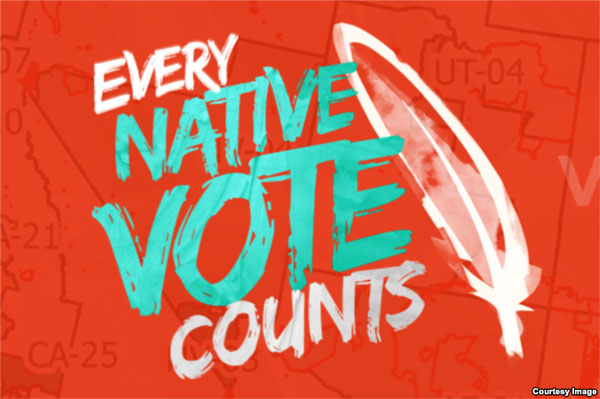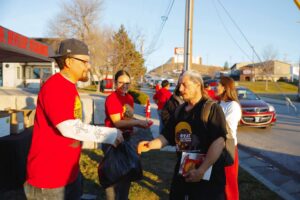
April 17, 2019; Williston Herald (Williston, ND)
The US House Subcommittee on Elections last week held a field hearing at Standing Rock in North Dakota on Tuesday, writes Sarah Mearhoff in the Williston Herald. Standing Rock is home to the Standing Rock Sioux nation and has been the battleground for the controversial Dakota Access Pipeline project that opponents fear could “leak and damage or destroy both drinking water and sacred sites.”
The hearing showcased both efforts to suppress the Native American vote in 2018—as well as the extraordinary community efforts that were undertaken to get out from under that suppression.
In the Herald, Mearhoff provides a concise summary of the effort in North Dakota to use a voter identification law to depress turnout. As Mearhoff explains:
North Dakota’s voter identification law made national headlines leading up to the 2018 election, when former US Sen. Heidi Heitkamp, a Democrat, was up for reelection.
Heitkamp won by less than 3,000 votes when she was first elected to the US Senate in 2012, a win that Charles Walker, the Chairman of the Judicial Committee for the Standing Rock Sioux Tribe, said was largely attributed to the Native vote.
Months after Heitkamp’s win, the North Dakota Legislature enacted its voter ID law, which requires voters to present a valid identification with a street address in order to cast a ballot. Many Native Americans living on reservations do not have street addresses, instead using a PO box as an address, because of the rural nature of their reservations. Activists have argued in and out of court that the North Dakota law infringes upon these citizens’ ability to vote.
At the hearing, eight Native Americans testified. Their testimony is publicly available online. The field hearing held at Standing Rock is one of a series planned by the committee. Other places where hearings have been either held or scheduled include Brownsville, Texas; Georgia; North Carolina; and Ohio.
Among the testimony offered at the hearing, Prairie Rose Seminole, an Native American voting rights activist, told the committee, “In the 2014, 2016, and 2018 we started to see more American Indian voters denied their right to vote because of the denial of common forms of identification such as tribal IDs and student IDs. Elders were turned away because they didn’t have ID cards and they no longer had the affidavit process, legitimizing their right to vote.”
Sign up for our free newsletters
Subscribe to NPQ's newsletters to have our top stories delivered directly to your inbox.
By signing up, you agree to our privacy policy and terms of use, and to receive messages from NPQ and our partners.
Seminole added that at Standing Rock, county voting officials “inefficiently equipped the polling sites with ballots.”
Ruth Buffalo, one of only two American Indian representatives in North Dakota’s 141-member state legislature, told the committee, “In the recent mid-term election of 2018, two traditional voting precincts were shut down within the exterior boundaries of the Fort Berthold Reservation 1) Dunn County North Fox precinct located in Mandaree at the St. Anthony Church 2) McKenzie County Four Bears precinct.” Rodger White Owl, CEO of the Mandan, Hidatsa, and Arikara Nation, noted that the effect of these shutdowns was that “some members had to travel 30 to 45 miles on Election Day to vote.
Ultimately, the obstacles—including shuttered voting stations, long distances to voting stations, and ID requirements—were surmounted and turnout of American Indian voters in 2018 hit unprecedented levels. But, as Alysia LaCounte, General Counsel of the Turtle Mountain Band of Chippewa Indians observes, this required an extraordinary mobilization.
As LaCounte explains, “The Youth Came to the Tribe an asked what are you going to do to prevent disenfranchisement of our People. The Tribal Government enacted law to enable voters to receive free Tribal Identification Cards. Understand that the fee of $15 is not exorbitantly high but $15 is milk and bread for a week for a poor family.”
LaCounte adds:
To get the 2,400 IDs issued, we experienced numerous technical difficulties. The first day of free tribal ID’s our ID machine melted down the actual physical IDs because it became too hot. As a result, we sought assistance through any means necessary, social media, news outlets, and moccasin telegraph. We received an outpouring of support and donations to further our cause. The Turtle Mountain Tribal College created a help line which the students volunteered manning. We purchased new machines to produce IDs and set them up at numerous locations throughout the community. Our dedicated Motor Vehicle Department staff worked 14-hour days for the two weeks through the date of the election. We held get out the vote rallies.
While we do not comment upon the intent of law…its practical implication acted to disenfranchise the people of the Turtle Mountain Band of Chippewa. We met the challenge and improved voter turnout from the 2016 presidential election by 42 percent. But please understand this took a great amount of financial and times resources. The Tribe organized like never before. The Tribe’s Youth led the charge.
After the hearing, US Representative G.K. Butterfield, a Democrat from North Carolina, remarked to him the testimony suggested “there is a deliberate effort in both Dakotas to suppress a portion of the vote.”—Steve Dubb












